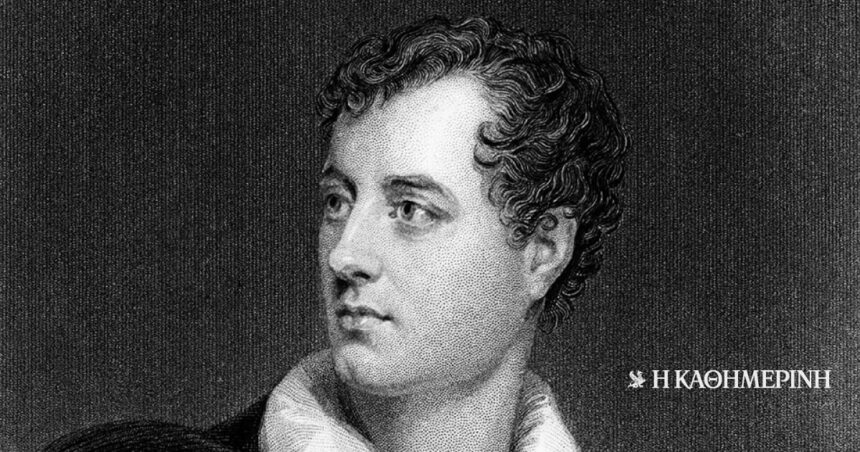Among the hundreds of Philhellenes who left their homelands and fought alongside the Greeks during the Revolution of 1821, the British aristocrat stands out George Gordon Byron. Byron left his indelible mark not only on the Struggle of the Greek Palingenesis but also on the romantic poetry of the early 19th century, being one of the greatest writers of the genre. At the same time, he was also involved in politics, like many young people of his social class, who joined the British Uighurs.
Byron was born on January 22, 1788 in Westminster, London. His parents were John Byron and Catherine Gordon. His father was a sailor and bore the nickname “mad jack” because of his restless life. Although many women passed through his life, he married twice, the Marchioness of Carmarthen, with whom he had a daughter, Augusta, and Catherine. Catherine drew on her descent from the royal Stuart family. Although she was not particularly beautiful herself, her vast fortune enticed “Mad Jack” to approach her, with the prospect of making her his wife, after her death Marquis of Carmarthenin order to pay off his many creditors. The couple soon ran out of money as John squandered most of their fortune.
He studied at Cambridge for a total of three years. This period was also one of the most creative in his life
Little George grew up in name only as an aristocrat, with extraordinary hardships and deprivations. When he was an infant, Catherine made the decision to move to Scotland, an area where she felt more familiar, in the hope that she could raise her son with the values befitting a scion of an aristocratic family. In 1798, fortune had a pleasant surprise in store for George, as he himself inherited from his grandfather’s brother the peerage of 6th Lord Byrona large estate with a tower and an old convent in Newstead. The life of ten-year-old Lord Byron has changed for the better. He moved with his mother to Nottingham and enrolled at a school attended by children of aristocratic families in Harrow.
Byron’s teachers at Harrow described him as a highly intelligent and gifted but lazy student. When he came of age and was entrusted with the management of the property he inherited, Byron enrolled at Cambridge, where he studied for a total of three years. This period was also one of the most creative in his life. He socialized with notable personalities and wrote many poems, drawing inspiration from his frequent love affairs.
In 1809 he began his long journey to the East, a tradition for many of the young British aristocrats of the time
In 1809 he began his great journey to the East, which was a tradition for many of the young British aristocrats of the time. During the journey, for the first time Byron set foot on lands inhabited by Greeks, about whom he had read much in the past. Impressed by the landscapes and people he met, he wrote in November 1809 to his mother that this trip was the most beautiful adventure that his memory could compose.
He was destined to return to the Greek peninsula once more during the Greek Revolution. His first destination was Kefalonia, which along with the rest of the Ionian Islands was under British rule. In 1823 he went to Messolonghi, where he breathed his last in April 1824. His contribution to romantic poetry is considered enormous. However, what the Greeks recognize is his contribution to Greek independence.
Column Editor: Myrto Katsigera, Vassilis Minakakis, Antigoni-Despina Poimenidou, Athanasios Syroplakis




